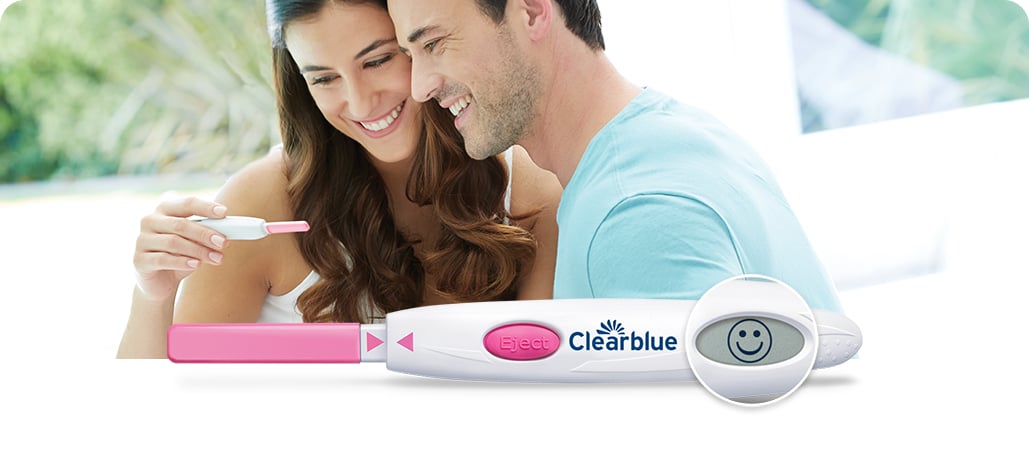In every cycle there are only a few days when a woman can conceive, so having sex on these days is very important if you are trying to get pregnant. The Clearblue Digital Ovulation Test helps you maximise your chances of conceiving naturally by identifying your 2 most fertile days each cycle by measuring the changes in level of a key fertility hormone – luteinising hormone (LH). It's more accurate than calendar and temperature methods* and gives you unmistakably clear results on a digital display.
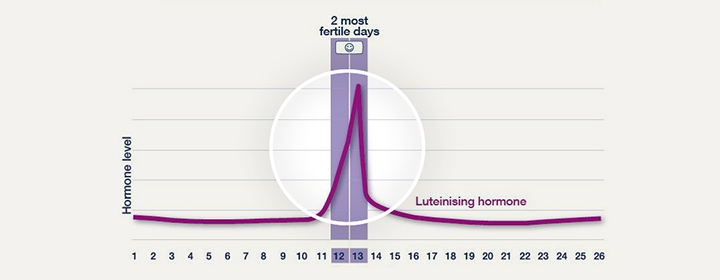
Shows your 2 most fertile days
By pinpointing your 2 best days to get pregnant you can be more confident you are trying at the right time.
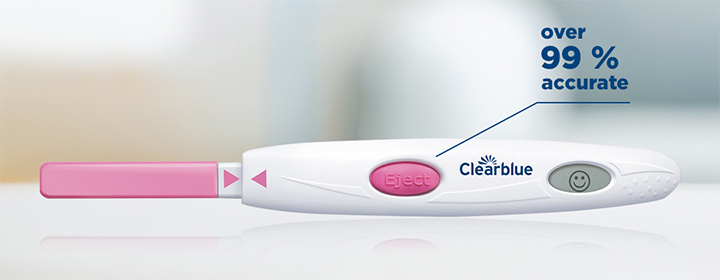
Over 99% accurate
More accurate than calendar and temperature methods at predicting the most fertile days*
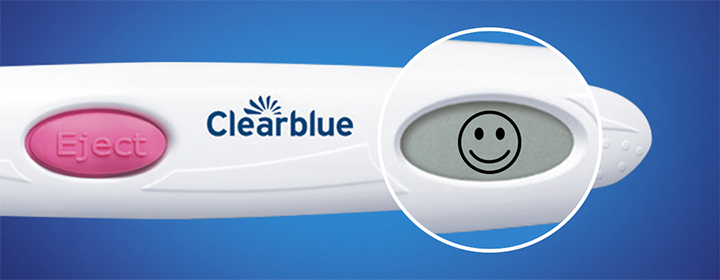
Clear digital results
With the clear digital display, your results are easier than ever to read.

Easy to use
Unique flashing 'test stick' symbol shows the digital ovulation test is working.
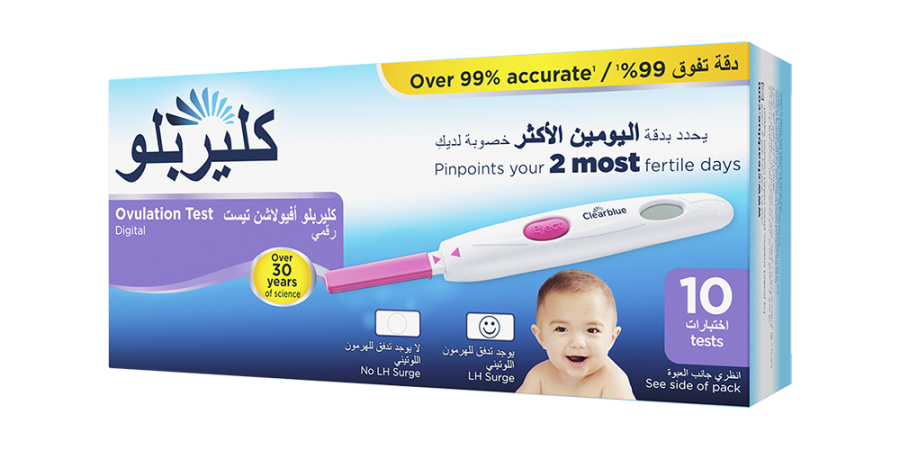
What do other people think ?
How to use Clearblue DIGITAL Ovulation Test
1. Before testing
- Please always read the instructions on pack and in the leaflet carefully before use.
- You need to know your usual cycle length before you start, to ensure you test at the right time to find your LH surge
- To work out your cycle length, count the day period starts (first day of full menstrual flow) as Day 1, and continue counting through to the day BEFORE your next period starts – the number of days is your cycle length.
- Once you know your cycle length, use the table below to find out when to start testing:
| Your cycle length in days | 21 or less | 22 | 23 | 24 | 25 | 26 | 27 | 28 | 29 | 30 | 31 | 32 | 33 | 34 | 35 | 36 | 37 | 38 | 39 | 40 | 41 or more |
| Start testing on the day next to your cycle length | 5 | 5 | 6 | 7 | 8 | 9 | 10 | 11 | 12 | 13 | 14 | 15 | 16 | 17 | 18 | 19 | 20 | 21 | 22 | 23 | 17 days before your next period |
- You can test at any time of the day, but you should test at the same time of day each day.
- Try not to urinate for four hours before you do the ovulation test, and you should avoid excessive fluid intake before testing – you might find it easier to use the first urine of the day.
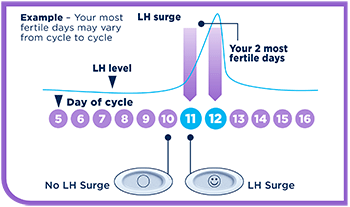
2. Getting the ovulation test ready
- Remove the ovulation test stick from the foil wrapper.
- Remove the cap
- Before applying urine to the ovulation test stick it must be inserted into the test holder.

- Align the pink arrow on the ovulation test stick with the pink arrow on the test holder and insert until it clicks into place.
- Wait for the 'test ready' symbol to appear and take the ovulation test immediately.
3. Doing the test
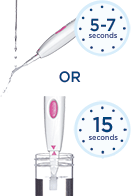 - Place the Absorbent Sampler pointing downwards in your urine stream for 5 to 7 seconds.
- Place the Absorbent Sampler pointing downwards in your urine stream for 5 to 7 seconds.
- Or collect a sample of your urine in a clean, dry container. Dip the Absorbent Sampler in the urine for 15 seconds.
- Take care not to get the test holder wet.
4. Wait for 3 minutes
 - Keep the sampler pointing downwards or lay the Test Stick flat. Throughout testing never hold the test with the absorbent tip pointing upwards.
- Keep the sampler pointing downwards or lay the Test Stick flat. Throughout testing never hold the test with the absorbent tip pointing upwards.
 - After 20 to 40 seconds the 'test ready' symbol will start flashing to show the ovulation test is working.
- After 20 to 40 seconds the 'test ready' symbol will start flashing to show the ovulation test is working.
- Do not eject the ovulation test stick before you get your result.
- Replace the ovulation test stick's cap and wait for 3 minutes.
5. Read your results
Within 3 minutes the Display will show your result.
 No LH surge: If you get a 'blank circle', the test hasn't detected your LH surge. Test again at the same time tomorrow using a new ovulation test stick.
No LH surge: If you get a 'blank circle', the test hasn't detected your LH surge. Test again at the same time tomorrow using a new ovulation test stick.
 LH surge: A 'smiley face' means you've detected your LH surge. Your 2 most fertile days are today and tomorrow so having sex in the next 48 hours will maximise your chances of getting pregnant.
LH surge: A 'smiley face' means you've detected your LH surge. Your 2 most fertile days are today and tomorrow so having sex in the next 48 hours will maximise your chances of getting pregnant.
- Once you have read your final result eject the ovulation test stick and throw it away.
- Your result can only be read on the test holder display - you cannot determine your result from any lines on the ovulation test stick.
- Your result will remain on the display for 8 minutes.
- Do not re-insert a used ovulation test stick.
Leaflet
Frequently asked questions
I do not know my usual cycle length or my cycle length varies. How do I know when to take an Ovulation Test?
If you don’t know your usual cycle length you are advised to wait for at least one menstrual cycle, and note the length of this cycle, before using Clearblue Digital Ovulation Test. Once you have determined your cycle length you can use the instructions overleaf to work out when to start testing. If your cycle length varies by more than 3 days then choose the shortest cycle you have had over the last 6 months to work out when to start testing. It is possible you may need to start a new pack and use the new test holder and test sticks to detect your LH surge. Alternatively, if you wish to start testing without knowing your cycle length, we recommend you start testing on day 10. (However, in this case it is possible you may miss your LH surge because you have started testing too late or you may need to start a new pack to continue testing. Refer to question 7).
What time of the day should I carry out the ovulation test?
You may test any time of day, but you should test at approximately the same time each day. You should not have urinated for at least 4 hours before testing.
Do I need to use all the ovulation tests?
No. You can stop testing when you detect your LH surge.
Can I use the test holder with any other test sticks?
You can only use Clearblue Digital Ovulation Test Sticks with this test holder. If you have test sticks left from a previous Clearblue Digital Ovulation Test Pack you can use the test holder in this pack.
I have done a test, but no result has appeared on the Display. What does this mean?
Your result should appear on the Display within 3 minutes of doing a test. If no result appears an error symbol will appear on the Display within 10 minutes. Refer to the full instruction leaflet for information on the error messages.
How accurate is Clearblue DIGITAL Ovulation Test?
The Clearblue Digital Ovulation Test has been shown in extensive laboratory trials to be over 99% accurate in detecting the LH surge prior to ovulation. The sensitivity of the Clearblue Digital Ovulation Test is 40mIU/ml.
I’ve done all the tests as instructed, but I’ve not yet detected my surge. What should I do?
The number of Test Sticks in a Clearblue Digital Ovulation Test pack is sufficient for most women with regular cycles to detect their LH surge. If your cycle length varies by more than 3 days then it is possible that you may need to start a new pack to detect your LH surge. Some women do not ovulate each cycle and therefore will not see an LH surge in such cycles. If you are concerned about your results please see your doctor.
Can any medication or medical conditions affect the result?
a. Always read the manufacturers’ instructions for any medication that you are taking before conducting a test. b. Certain medical conditions and medications can adversely affect the performance of the Test: for example if you are actually pregnant, have recently been pregnant, have reached the menopause or have polycystic ovarian syndrome you may get a misleading result. This may also be true if you are taking fertility drugs containing Luteinising Hormone or human Chorionic Gonadotrophin. Please check with your doctor. c. Clomiphene citrate does not affect the tests, but may affect the length of your cycle and, therefore, when you should be testing. You may need to start a new pack and use the new test holder and test sticks to continue testing.
I’ve recently stopped using hormonal contraception (e.g. the contraceptive pill). Will this affect the results?
No, it will not affect your results. However your natural hormone pattern is disrupted by hormonal contraception and if you have recently stopped using it your cycles can be irregular and may take some time to stabilise. You may wish to wait until you have had two natural menstrual cycles, and note the length of these cycles, before using Clearblue Digital Ovulation Test.
I’ve used Clearblue DIGITAL Ovulation Test for several months and haven’t become pregnant. Can I be sure of getting pregnant?
It can take many months to become pregnant. There are many reasons why you may not become pregnant even if you’ve been able to have sex at your most fertile time. If after several months you’ve had no success, you should consult your doctor.

